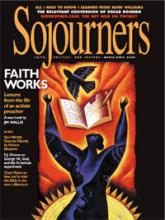From the pulpit, I looked out over the standing room only crowd and could feel the electric excitement in Seattle’s St. James Cathedral. It was Sunday night, just before the week of scheduled protests that would rock the World Trade Organization (WTO) meeting and the world. We were all gathered for a religious service organized by Jubilee 2000, the grassroots campaign to cancel the debt of the world’s poorest countries. Just before I preached, a text was read from Leviticus 25, which proclaims the biblical jubilee—a periodic economic redistribution in which slaves are set free, land is returned, and debts are forgiven. Jubilee is a call for a regular "leveling" of things, given the human tendency toward over-accumulation by some while others lose ground. The Bible doesn’t propose any blueprint for an economic system, but rather insists that all human economic arrangements be subject to the demands of God’s justice, that great gaps be avoided or rectified, and the poor are not left behind. As I listened to the prophetic scripture being read, I marveled at how it was being used that night—as a relevant contribution to a public discussion on the rules of global trade!
However, the official discussion planned in Seattle was never meant to be public. A quiet and private WTO meeting of a very elite group had been scheduled to determine the rules of the global economy. But the events of the next several days would shout a message heard around the globe—that the talk about how to conduct international trade would no longer be a private conversation. Instead of a small, behind-the-scenes meeting to determine the rules of global trade, a very noisy public debate ensued, asking who makes those rules, who benefits, and who suffers.
Read the Full Article
